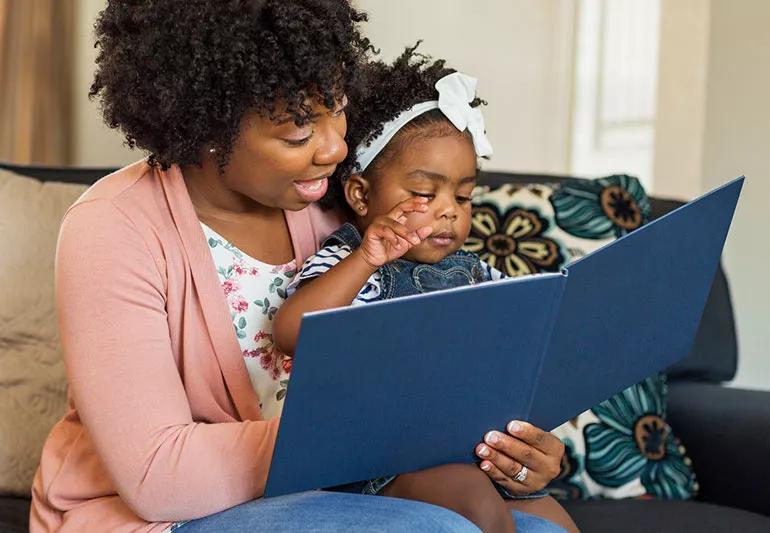It’s never too early or too late to start

Even though your baby can’t grasp a book or sound out the letters of the alphabet, it’s not too soon to introduce your little one to the magic of books.
Advertisement
Cleveland Clinic is a non-profit academic medical center. Advertising on our site helps support our mission. We do not endorse non-Cleveland Clinic products or services. Policy
“Reading to babies and young children is so important,” says pediatrician Sarah Klein, MD. “It provides the building blocks for language. And it gives them the tools for forming lifelong social and emotional skills.”
Worried that reading is one more thing you have to squeeze into your bleary-eyed day as a parent? Take heart. Getting into the reading habit doesn’t have to be time consuming or complicated, Dr. Klein says. And adding books to your routine has a host of benefits for you and your baby.
Reading is a skill that will serve your children well in school and in life. But hearing books read aloud has benefits long before they show up for their first day of kindergarten. Those benefits include:
Advertisement
When should you start reading to your baby? According to Dr. Klein, it’s never too early, and it’s never too late. She adds that while sooner is usually better, young children can still benefit from being read to at any age.
Dr. Klein shares some tips to make reading fun and effective.
Read to your kiddo for at least a few minutes each day. “Try to get in as much reading as you can,” Dr. Klein says, whether it’s one longer bedtime book session or shorter reading breaks throughout the day.
“Babies might only be interested for a few minutes. As they get older, their attention span can start to handle longer stories.”
Your tot wants to turn back to look at the first page again and again? Just roll with it. Let your little one point out the pictures they like on the page or talk about what you see, even if it means you won’t get around to finishing the story. Once your child is old enough, let them choose the books you read.
Once your baby starts crawling and toddling, it can be challenging to get them to sit still. But even if they’re scooting around the room, your child will still benefit from hearing you read aloud.
“Don’t get frustrated if your baby isn’t sitting quietly in your lap for storytime,” Dr. Klein says. “Reading doesn’t have to be this perfect quiet moment where everyone is paying attention.”
“Babies need to explore their environment,” Dr. Klein says. Let them discover books on their terms — even if that means they’re holding it upside-down or drooling all over it.
Babies do well with chunky board books they can hold (and, yes, chew). They like bright colors and big pictures. As they get older, introduce books with more words to help their language development, Dr. Klein says.
You’re not locked into reading the words on the page. Engage with your little listener by pointing out pictures, asking questions or speculating why those dogs are wearing hats and driving cars.
Kids love to read the same books over and over (and over). That might drive you bananas, but the repetition helps kids learn, says Dr. Klein. So go ahead and read about that hungry caterpillar for the millionth time this week.
To break up the monotony, try to strike a deal: At bedtime, you’ll read one book your kiddo chooses and a new one that you pick.
“School-age kids still benefit from reading with their parents, especially as they’re trying to learn to read on their own,” Dr. Klein says. “Try reading back and forth, taking turns reading out loud to each other.”
Before you know it, your babies will be big kids who can read to themselves — and you might even miss that caterpillar and his endless appetite.
Advertisement
Advertisement

Sign up for our Health Essentials emails for expert guidance on nutrition, fitness, sleep, skin care and more.
Learn more about our editorial process.
Advertisement

Around age 4, start talking to your child about what an emergency is and how to call emergency services

Most kids are eligible to start kindergarten when they’re 5 — but age isn’t the only factor to consider

This child development strategy is all about meeting your child where they are

Tiny taste-testing is a way babies can explore their world, relieve aching gums and self-soothe

Start with a few minutes a day and work your way up to an hour or more to help your baby hit developmental milestones

This important activity helps babies reach developmental milestones like rolling, sitting up and crawling

Being the oldest, youngest or middle child may affect characteristics and traits, but the theory isn’t an official medical or psychological diagnosis

Being the oldest female sibling in your family can have an impact on your personality and behavior

Even small moments of time outdoors can help reduce stress, boost mood and restore a sense of calm

A correct prescription helps your eyes see clearly — but as natural changes occur, you may need stronger or different eyeglasses

Both are medical emergencies, but they are very distinct events with different causes